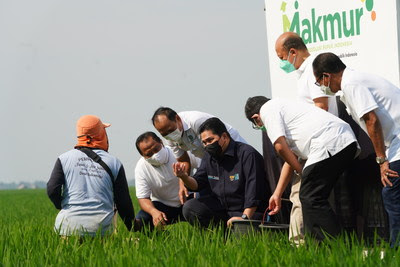- Makmur Program initiated to help farmers to increase their income and productivity through comprehensive and sustainable technical assistance and agriculture cultivation.
- An ecosystem made up of a collaboration between state-owned companies to create full-service opportunities for farmers and agricultural stakeholders
- A planting area of 250 thousand hectares targeted, with several priority commodities such as rice, corn, sugar cane, oil palm, and coffee
JAKARTA, Indonesia, Nov. 1, 2022 /PRNewswire/ — The Minister of State Owned Enterprises (SOE) of the Republic of Indonesia, Erick Thohir, initiated the Makmur Program since 2021 to help farmers to increase their income and productivity in Indonesia through comprehensive and sustainable technical assistance and agriculture cultivation.
Makmur is an agriculture ecosystem which connects farmers and agriculture stakeholders from upstream to downstream which aligns with the G20 agenda, specifically continuation of economic growth from the impact of the Covid-19 pandemic.
“The progression of the Makmur program is something we should keep our eyes on. As directed by the President, I will ensure that SOEs will play a role in supporting farmers and providing solutions, to level up their productivity and prosperity,” said Minister Thohir.
The ecosystem is a collaboration of state-owned companies in the Food and Fertilizers, Plantation and Forestry, Financial Services, and Insurance clusters. The Minister of SOEs supported Makmur by establishing a Project Management Office (PMO) led by Indonesia Food Holding Company (ID FOOD).
In addition to establish this ecosystem, Minister Thohir explained that Makmur also provides on-farm and off-farm technical assistance. On farm control consists of agro inputs such as fertilizers, seeds, pesticides. There is also support for soil analysis, fertilizer recommendations, agronomic and cultivation assistance, to the application of agricultural technology.
Off-farm assistance includes farmers receiving access to capital (banking loans to distributor financing), agricultural risk protection (insurance), licensing support and guidance from local governments, guarantees for buyers of crops from partners (off takers) with competitive prices, provision of training and capacity building.
This program is a comprehensive solution for the agricultural sector in Indonesia as previously, Indonesian farmers faced many problems, such as limited access to information, capital, markets, and technology required. In addition, some farmers have not implemented agricultural cultivation practices leading to low agricultural productivity and income.
The President Director of ID FOOD, Frans Marganda Tambunan, said that based on the combined data of state-owned companies until Semester I 2022, Makmur’s progress had been realized up to 60%. It has been implemented on areas of 184,305 hectares with a total of 84,431 farmers. This includes the realization of land expansion, supply of fertilizers, technical assistance, off-taking activity including the involvement of the private sector, and funding for People’s Business Credit from state-owned banks. Farmers experienced productivity and income improvement in all commodities.
This effort is intended to support the government in anticipating any potential food crisis. The program, a collaboration between ID FOOD as project leader with Pupuk Indonesia Holding Company (fertilizer sector), PTPN Holding Company (plantation sector), Perhutani (forestry sector), Bank Rakyat Indonesia and Bank Negara Indonesia (banking sector), Jasindo and Askrindo (insurance sector), Telkom Indonesia (telecommunication and media sector), and others stakeholders, provides access on-farm and off-farm assistances which will create a supportive ecosystem for agriculture stakeholders. “This synergy across SOEs is expected to mitigate a potential food crisis,” said Tambunan.
Meanwhile, President Director of Pupuk Indonesia Holding Company, Bakir Pasaman, revealed that the Makmur Program targets a number of agricultural crops, including rice, corn, sugar cane, oil palm, and coffee. This program has been implemented in many places across Indonesia, such as West Java, Central Java, East Java, South Sulawesi, Lampung, North Sumatra and West Nusa Tenggara. “We are targeting this program to cover 250,000 hectares in 2022,” said Pasaman.
Not only bringing benefits to farmers, Makmur also provides benefits to all stakeholders and partners involved. The government can also guarantee the availability of food commodities nationally.
Twitter : @pupuk_indonesia
YouTube : PT Pupuk Indonesia Official
Instagram : @pt.pupukindonesia
Photo – https://mma.prnewswire.com/media/1934684/JAR02233.jpg


